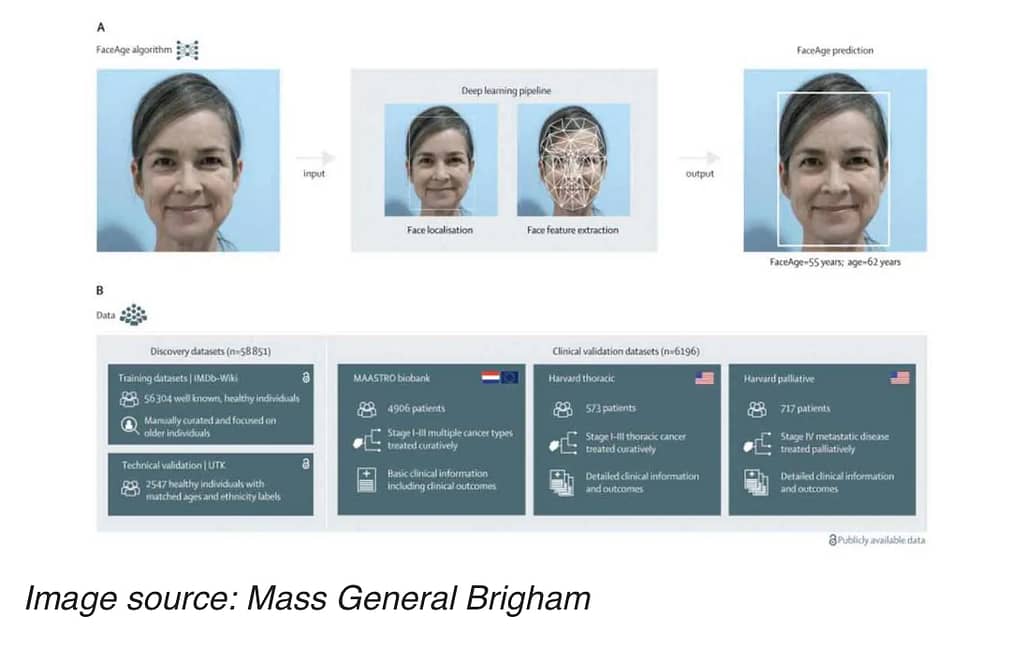AI FaceAge Cancer Prognosis: How Facial Analysis Could Predict Survival Outcomes

What if a simple photograph could do more than capture a moment?
What if it could provide doctors with critical insights about your health and even predict your survival chances?
That’s Exactly what FaceAge Does
FaceAge, an AI tool developed by Mass General Brigham and Harvard Medical School, is designed to do exactly that. This advanced AI system uses facial photographs to predict AI FaceAge cancer prognosis, potentially transforming the way doctors assess patient outcomes.
What is it and How Does It Work?
FaceAge is a deep learning tool that estimates biological age based on facial characteristics like skin texture, wrinkles, and facial structure. It goes beyond chronological age, focusing on how old a person appears biologically, which can reveal deeper health concerns.
The AI was trained using over 58,000 facial images from the IMDb-Wiki and UTKFace datasets, including individuals aged 60 and older. The researchers then applied the AI to over 6,000 cancer patients, using their facial data to assess the potential for AI FaceAge cancer prognosis.
Key Findings:
- On average, cancer patients appeared 5 years older biologically than their actual age, with a higher FaceAge score correlating to worse survival outcomes.
- The AI’s predictions were associated with genetic markers of cellular aging, suggesting that FaceAge captures health indicators not visible through age alone.
- Physicians who included FaceAge risk scores alongside clinical data significantly improved their 6-month survival predictions for cancer patients.
Why This Matters in Cancer Prognosis
We’re always told not to judge a book by its cover, but FaceAge suggests our faces might actually reveal crucial health insights. Physicians have long relied on subjective impressions of a patient’s appearance to make survival predictions, but FaceAge turns those gut feelings into quantifiable data.
- AI FaceAge cancer prognosis provides an objective measure of biological age, potentially helping doctors to personalise treatment plans.
- The AI could also assist in end-of-life decision-making, offering doctors more accurate survival predictions based on a patient’s facial photograph.
What’s Next for AI FaceAge in Cancer Prognosis?
While the tool shows promise in predicting cancer outcomes, further testing and refinement are needed. Researchers are exploring its application in other diseases and working to reduce potential biases related to ethnicity and socioeconomic status.
For now, AI FaceAge cancer prognosis is a compelling example of how AI can turn ordinary photos into actionable health data, potentially giving doctors a new tool to predict — and perhaps even improve — patient outcomes
Sources and Acknowledgements:
Mass General Brigham. Read more and watch their video
Harvard Medical School. Read more and download additional information including coding
The Lancet. Details of the study and link to download a pdf
The Rundown : your daily news feed on all things AI – where I first read about this.

Based on this, I should be ok for a while yet then!
Just the the start of what surely will become a massive improvement
in testing and medical diagnostics in the future.
AI has already made in impact and has the potential to be used extensively in medicine. This is another promising piece of research. On a personal level my Garmin tells me I’m 12 years younger but I doubt my face age tells the same story. More probably a few years older 🙁
Thanks for your comment, June! Yes, AI is certainly making waves in the medical field, and it’s fascinating to see how tools like FaceAge could potentially improve health outcomes. But don’t worry — you’re not alone with those age estimates! I think many of us would prefer to go with our fitness tracker’s version of events rather than what the mirror says. Me too Keep that younger age in mind — it’s the one that counts!
DeeBee